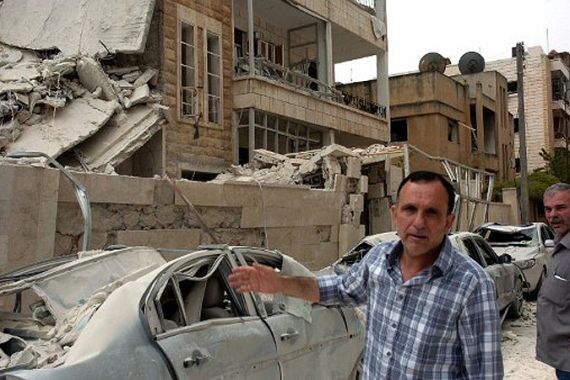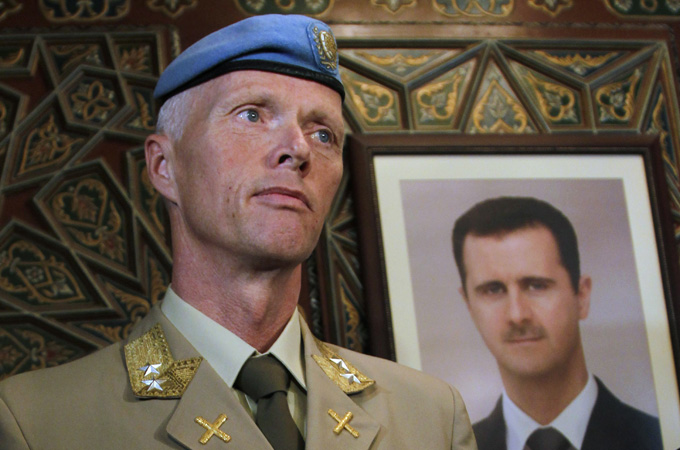Deadly blasts strike Syria’s Idlib
Explosions in the northwestern city reported despite UN-backed ceasefire that came into effect on April 12.

Syria’s state-run news agency says two blasts in the northwestern city of Idlib have killed at least eight people and caused serious damage, amid appeals by the head of the UN observer mission in the country for both sides to stop fighting.
SANA said civilians and security officers were among those killed in Monday’s bombings.
State media blamed the attacks on “armed terrorists”, a term it uses to describe those trying to overthrow President Bashar al-Assad.
State television said monitors from the UN team sent in to oversee an18-day-old ceasefire were visiting the scene in Idlib.
Opposition activists said the explosions went off outside a security compound and near a hotel where the UN observers were staying.
Al Jazeera’s Rula Amin, reporting from Beirut in neighbouring Lebanon, quoted the activists as saying that “two huge explosions took place [in Idlib] near two security buildings, one of which belongs to the air force intelligence, and the other to the military security”.
Activists’ accounts
According to the Syrian Observatory for Human Rights (SOHR), more than 20 people were killed in the Idlib blasts.
The majority of those killed were members of the security forces, the UK-based opposition group said.
A third blast rocked Idlib hours after the twin explosions, SOHR said.
“An explosion shook the university neighbourhood in Idlib … and there are reports of wounded,” it said.
The SOHR reported a separate powerful blast near the capital, Damascus, that caused casualties.
“A strong explosion shook the suburbs of Qudsiya and it appears it was a car bomb,” it said. “Initial reports indicate there are casualties.”
Al Jazeera is unable to independently verify reports of violence, as the Syrian government has placed strict restrictions on reporting.
Another opposition monitoring group, the Local Co-ordination Committees (LCC), confirmed that it had received reports of several “suspicious explosions” early on Monday in Damascus “in or near several government buildings, including the official state media and television office; a security centre in Rukneddine; and the Central Bank building in Sabaa Bahrat Square”.
‘Escalation in bombings’
Al Jazeera’s Rula Amin said: “We have seen in the past two weeks an escalation in the bombings and targeting of the security officers and security buildings.
“The government has been blaming al-Qaeda for these attacks and they want to make sure this narrative overruns any other narrative.
“What we are hearing from the activists again is blaming the government in order to fortify and strengthen that kind of argument. So again, they are accusing each other, but on the ground it is an escalation.”
 |
| The head of UN observer mission to Syria says ‘even 1,000 unarmed observers cannot solve all problems’ [Reuters] |
Jihad Makdissi, Syrian foreign ministry spokesperson, said the head of the UN mission, Norwegian General Robert Mood, was being briefed on “violations by armed opposition”.
The blasts took place in spite of the UN-backed ceasefire that came into effect on April 12 but has failed to stop the violence.
Mood urged all sides on Sunday to abide by the ceasefire as he arrived in Damascus to take command of the UN military observer mission.
The peace plan – arranged by Kofi Annan, UN and Arab League envoy – calls for a commitment to stop all armed violence; a daily two-hour humanitarian ceasefire; media access to all areas affected by the fighting; an inclusive Syrian-led political process; a right to demonstrate; and the release of arbitrarily detained people.
The UN ceasefire monitors are gradually arriving in Syria, with 30 out of a planned 300 now on the ground.
Mood, a veteran of previous Middle Eastern peace missions, has acknowledged the huge task awaiting the unarmed mission but says he is confident it could make headway.
“We will be only 300 but we can make a difference,” he said in Damascus on Sunday. “Thirty unarmed observers, 300 unarmed observers, even 1,000 unarmed observers cannot solve all the problems.”
Speaking to Al Jazeera from Beirut, Joseph Kechichian, a Middle East analyst, said: “Since April 12, when the ceasefire was supposed to come into effect, almost 500 people have been killed on both sides in Syria. The presence of the UN observers is not making any difference whatsoever.”